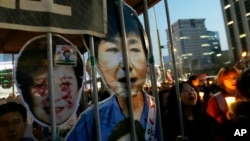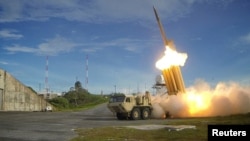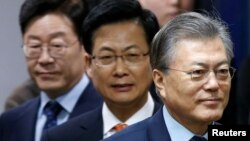Newly appointed U.S. Secretary of State Rex Tillerson will visit this week with caretaker conservative officials in Seoul, who might all soon be swept from power.
South Korea is in the midst of disruptive political change with liberal opposition leaders, who don’t see eye to eye with the United State on North Korea policy, poised to win a soon to be held presidential election.
Last week’s Constitutional Court decision to uphold the impeachment of President Park Geun-hye set in motion a 60-day deadline for scheduling a new presidential election. President Park’s sudden downfall was caused by a domestic scandal, her alleged connection to a multi-million dollar influence bribery scheme involving top Korean conglomerates.
But the upcoming election is also expected to be a referendum on Park’s hardline foreign policy positions to deal with the increasing North Korean nuclear threat through coercive pressure only, using increased economic sanctions and military deterrence.
United front
This week, Tillerson is likely to see only scenes of unity when he visits with American military forces in South Korea engaged in joint exercises, that include the nuclear powered aircraft carrier the USS Carl Vinson, in a show of force to counter North Korea’s advancing nuclear and missile capabilities.
North Korea has warned it would launch "merciless" attacks if the carrier infringes on its sovereignty or dignity during the drills.
Tillerson will also likely hear only words of support for U.S. policy when he meets with Acting President Hwang Kyo-ahn and South Korean Foreign Affairs Minister Yun Byung-Se. Both conservative interim officials echo the U.S. on the need to increase North Korean sanctions to pressure the Kim Jong Un government to dismantle its' nuclear arsenal in return for security guarantees and economic aid.
Any compromise in this position, many conservatives say, will only legitimize North Korea as a nuclear state.
Thae Young Ho, the former deputy head of the North Korean Embassy in London until he defected to the South last year, argues further that any negotiations are futile because North Korean leader Kim Jong Un will never give up his nuclear arsenal.
“I am absolutely sure that the only way to solve the North Korean nuclear issue fundamentally is the elimination of the Kim Jong Un regime,” said Thae.
THAAD
Both sides will likely voice strong support for increased deterrence, especially the controversial THAAD missile defense system that can potentially intercept a nuclear-armed North Korea ballistic missile at a high altitude.
Washington and Seoul have both defended THAAD, as well as expanding the scale of joint military drills in South Korea, as a necessary security measures in the face of North Korea’s numerous ballistic missile launches and nuclear tests conducted in the last year.
Both also want to resolve through talks China’s strong opposition to THAAD as an unnecessary and provocative military escalation, and its concern that the system’s powerful radar could be used to monitor others in the region. Beijing is reportedly retaliating by restricting the operations of some South Korean companies, and limiting imports and tourist visas.
For some advocates, THAAD has become an issue of maintaining national sovereignty in the face of Chinese pressure, as much as it is a needed defensive measure.
“We’re going to find out whether the South Koreans are willing to give up their sovereign right to defend themselves and if South Korea is willing to accept becoming the Chinese vassal,” said Grant Newsham with the Japan Forum for Strategic Studies in Tokyo.
South Korea first
But while the U.S. priority may be to prevent North Korea from developing a nuclear-armed long-range missile that could reach the American mainland, liberals in South Korea want to first reduce the risk of war on the Korean Peninsula.
Moon Jae-in, the leading presidential candidate from the Democratic Party of Korea, wants to take a less confrontational approach to deal with the current reality, rather than hoping for the collapse of the Kim government.
“We can’t deny that the ruler of the North Korean people is Kim Jong Un. We have no choice but to recognize Kim Jong Un as a counterpart, whether we put pressure and impose sanctions on North Korea or hold dialogue,” said Moon.
The liberal presidential candidates also value the strong U.S. military alliance and support international sanctions on North Korea, but they argue that the punitive-only approach has failed to force North Korea to the negotiating table. In fact, they point out, Pyongyang has accelerated nuclear and ballistic missile testing at an unprecedented rate in the last year despite the increased international sanctions imposed on them.
Liberal leaders advocate a return to engagement polices that might rebuild trust and reduce tensions through exchanges and selective economic aid and joint ventures.While the South Korean Sunshine policy of engagement that began at the turn of the century ultimately failed to stop the North from developing nuclear weapons, they argue it did have some success in slowing the pace of progress. Advocates say it may be worth the effort to try again, to focus on fostering long-term peaceful internal change through economic interaction.
“You got to be really honest and accepting what has not been working, and what has been working, and try to see a new approach,” said Bong Young-shik with the Yonsei University Institute for North Korean Studies in Seoul.
Some leading opposition candidates also oppose THAAD as an American military escalation aimed at China that would do little to protect South Korea from the thousands of missiles and artillery North Korea has already in position near the border.
Keeping China as an engaged economic and diplomatic partner, they say, is more in South Korea’s interest than siding with the U.S. on THAAD.
The South Korean liberal coalition won the majority in the National Assembly last year, and is ahead in presidential election public opinion polls.
Youmi Kim contributed to this report


